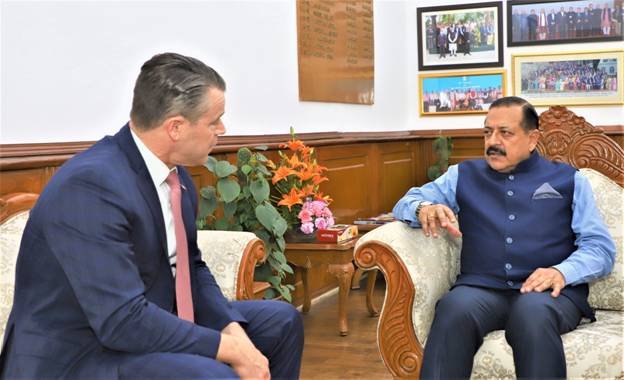35 projects by TIHs with US research institutions identified
A high-level US delegation, led by US Senator Todd Young, has sought deeper bilateral cooperation with India in areas like Artificial Intelligence (AI), Quantum, Cyber Security, Semiconductor, Clean Energy, Advanced Wireless, Biotechnology, Geosciences, Astrophysics and Defence, etc.
Todd Young made the call during a meeting with Dr Jitendra Singh, the Minister of State for Science & Technology, suggesting scaling up collaboration and exploring opportunities to partner in quantum technology, ocean science, nuclear energy, semiconductors, supercomputing and other latest emerging technologies.
An official from the Department of Science and Technology informed the Minister that a total of 35 joint projects have been identified which will be implemented by the Technology Innovation Hubs (TIHs) and the US research institutions. Six TIHs under NM-ICPS have been identified for collaborative research and development with NSF-supported institutions.
The Hubs are part of a five-year, nearly US$430 million, investment by DST under the National Mission on Interdisciplinary Cyber-Physical Systems and comprise academic researchers and industry partners. Additionally, the Indo-US joint clean Energy R&D programme is an ongoing joint initiative of the Ministry of Science and Technology and the US Department of Energy.
Todd Young informed that the US looks forward to a greater synergy and collaboration between the DST launched Technology Innovation Hubs and National Science Foundation as NSF has a foundation of academic expertise and core commercial competencies.
Dr Jitendra Singh highlighted new opportunities and possibilities in all areas of scientific endeavours, but more so in areas of Space, Biotech, Geospatial and Sustainable StartUps.
He pointed out the key scientific challenges and projects like Cleanliness, Hydrogen Mission, Digital Health Care system, Deep Ocean Mission, Clean Energy and StartUps being initiated in India.
Talking about another area of collaboration, Dr Jitendra Singh said that he was happy to inform that the Union Cabinet has approved the LIGO-India project to build an advanced gravitational-wave detector in Maharashtra at an estimated cost of Rs.2,600 crore.
The facility’s construction is expected to be completed by 2030. The observatory will be the third of its kind, made to the exact specifications of the twin Laser Interferometer Gravitational-wave Observatories (LIGO), in Louisiana and Washington in the US LIGO-India will work in tandem with them.
The Minister and the Senator were also informed about five potential areas of collaboration between Geological Survey of India and United States Geological Survey for setting in place an MoU.
Dr Jitendra Singh also promised complete support from the Science and Technology Ministry for Indo-US collaboration in budding and promising StartUps in Bio-tech, Dairy and Agri-tech sectors.
Dr Jitendra Singh said, “These are the best of the times for both India and America to forge a durable and strong bond for global leadership in fighting global challenges.
“There is much of ease in the relationships and a clear sign of willingness and optimism to achieve the desirable goals.”
The Minister hoped that the US will come to the aid of its natural ally (the oldest and largest democracies of the world) when it comes for technology transfer in critical areas, as there is no other option but to collaborate. fiinews.com










